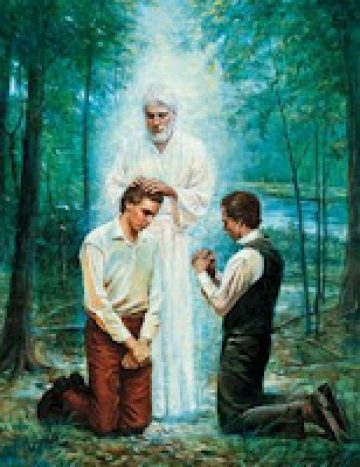
Let me say upfront that I thought this was a very tough lesson to prepare. Here is how I would approach it if I were asked to give the lesson in my ward this Sunday:
Introduction
This lesson focuses on the events surrounding the restoration of the Aaronic priesthood to Joseph Smith and Oliver Cowdery by John the Baptist in 1829. The lesson manual goes into quite a bit of what I would consider technical details about the event itself, legal administrators of priesthood keys, Elias, etc.
It has been my general experience that whenever the topic of the restoration of the priesthood is discussed in Relief Society, if it goes anywhere beyond just the superficial facts of the events that occurred and/or lists of the types of authority conferred, most women lose interest, and lose interest fast. Most really don’t have a foundational knowledge about the technical aspects. Among other things, most women I know couldn’t tell you the big differences between the Aaronic and Melchizedek priesthoods, who came to the earth to restore each priesthood, etc. However, it has also been my general experience that most women will say that they believe in the priesthood, and that they know that the power of the priesthood is real.Question: If this has been your experience as well [please feel free to share contrasting experiences], why do you think most women seem disinterested in learning about the technical aspects of the priesthood?
Question: Why would it be important for all members of the church, and not just the men, to understand these concepts on a more profound level?
Question: Do you think it is important to have both a spiritual and technical understanding of the priesthood? If so, why?
Question: If one did want to gain a greater knowledge regarding the restoration of the priesthood, what steps might one take in order to do so?
Question: Beyond learning the factual/technical aspects, how might one spiritually understand the topic of the restoration of the priesthood?
[Segue re: focus on gaining both a greater spiritual and technical understanding of the priesthood during today’s lesson.]
Question: According to Joseph Smith on pp. 81-82, what are the three reasons that John the Baptist is considered to be one of the greatest prophets of all time?
John the Baptist fulfilled the important missions of preparing the way before the Savior and baptizing him.
Question: What exactly did John’s mission to “prepare the way” for the Lord entail? Why was this preparation essential?
Question: Why is this preparation that John performed important to our understanding of the Aaronic priesthood? What is the connection between John’s preparation and the preparation experienced by Aaronic priesthood holders?
Question: Even though we do not hold the priesthood, how can we support the preparation of Aaronic priesthood holders? If you have children, would you feel comfortable teaching your sons (and daughters) about the technical aspects of the priesthood?
There must be legal administrators in the kingdom of God.
Question: What in the heck is a “legal administrator,” and what does it have to do with the priesthood?
Question: What do you think God is trying to teach us with this whole legal administration component? Don’t you think God could have just restored the priesthood anyway he wanted to? Why was he constrained to do it via legal administration?
Question: How does the legal administration concept come into play in the every day functioning of the modern LDS church?
A person who has the spirit of Elias has a preparatory work assigned to him/her by the Lord.
Read the Bible Dictionary entry for Elias with the class.
Question: What does “Elias” mean?
Question: Who can have the spirit of Elias? If one desires the spirit of Elias, how can one go about obtaining it?
Question: What is the connection between the spirit of Elias and the Aaronic priesthood?




3 Responses
In regards to your “legal administator” questions, I think God is teaching us that everything he does has to do with His laws. Wasn’t that why Christ had to be baptized? To fulfill the “law”?
I was rather hung up on that legal administrator part as well until my husband pointed out that our county has a legal administrator who administers the affairs of the county. In the church, according to God’s law, their are men who have been authorized and “legally” commissioned to administer the ordinances of the gospel so that the rest of us can obtain salvation. Otherwise we could not be baptized, partake of the sacrament, be sealed in the temple, etc. That whole section was hard to understand until I wrapped my brain around the whole “legal” aspect.
Otherwise, with all due respect, the women I know are very knowledgeabe about the Priesthood and don’t find it all that technical.
Thanks for your questions that gave us food for thought.
I usually love your lessons, I have come here many times for new ideas and some help. I am a woman who is new to the teachings of the Church and am learning a lot through the lessons I teach, however I feel that your lesson was not prepared with a prayer and is missing the spirit that I usually get. I started to struggle a bit with the concept that men are the ones in power. Then I thought, Do I really want the priesthood and the burdens that you would have to bare? Do I want to stay up all week worrying about my ward as our bishops do? I am so grateful for this site, and it does offer so much. I hope that you are okay…..it seems as though there is a bit of a spiritual struggle going on.
John 8:32 says, “And you will know the truth, and the truth will set you free.”
Never stop searching for the truth, even when you think you’ve already found it.